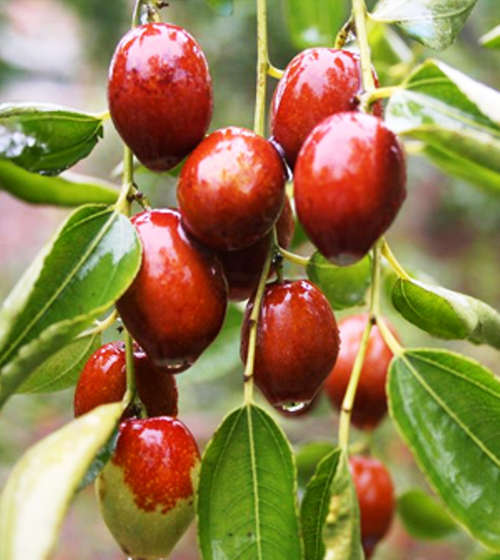Botanical name: Ziziphus jujuba
Jujubes are a very interesting fruit with an even more interesting history. From the Rhamnaceae or Buckthorn botanical family, they've been cultivated in China for more than 4,000 years. While jujube trees are extremely hardy and can flourish in even extreme temperatures with as little as eight inches of rainfall a year, they prefer sunny over shady areas.
Jujube trees grow at around 40 feet with shiny green leaves, modest-looking blossoms, and grape-to-strawberry-sized fruits containing a single large seed in the center. This makes them drupes.
Jujubes taste like a cross between an apple, plum, and peach,with a crispy texture, edible skin. When ripe, they can be stored at room temperature for about a week.
Dried jujube varieties can be used to substitute dates or apples in recipes. Just peel the fruit and remove the single seed inside. Jujubes can also be pickled whole or used to make tea.
Health Benefits of Jujubes
While they may not have a large amount of any one nutrient, jujubes contain a wide array of different ones, including magnesium, potassium, copper, niacin, calcium, manganese, phosphorus, and iron. They contain 20 times more vitamin C than any citrus fruit, strengthening the immune system and fighting infections, which may be why they've been used medicinally for millennia in many cultures, as a tea for sore throat, for example. Medical studies have found that jujube fruits and extracts have the capacity help lower blood pressure, reverse liver disease, treat anemia, and inhibit the growth of tumor cells that can lead to leukemia. Jujube extracts are also used in skin care products used to diminish wrinkles, relieve dry skin, and treat sunburn pain.
How one fruit can have all these benefits has to do with not just the combination, but also the complexity of its phytonutrients. Scientists have identified eight flavonoids in jujube fruit, including spinosin and swertish, which have sedative properties – undoubtedly the reason jujube seeds are used to treat anxiety and insomnia in traditional Chinese medicine.
The free radical-scavenging phenol puerarin in jujubes helps keep your cholesterol levels in the normal range and decrease your risk of cardiovascular disease. The flavonoid apigenin (also found in chamomile, thyme, and red wine) contains antioxidants as well as anti-inflammatory and anti-tumor properties, helping to reduce the risk of cancer and positively impact the liver, digestion, and allergies.
Jujubes are also loaded with 18 of the most important amino acids, which aids in the formation of more than 50,000 proteins in the body, one of which triggers the wound-healing process.
5 SEEDS PER PACK. ONLY 1 SHIPPING FEE FOR MULTIPLE ORDERS

